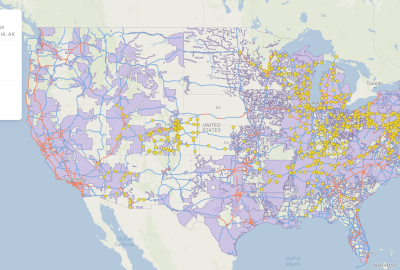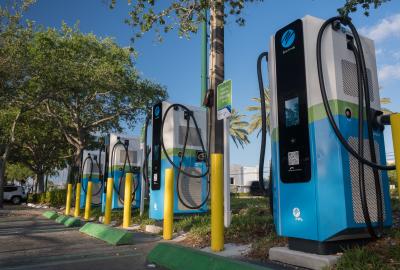Electric companies across the nation are looking to support and simplify the electrification of transportation, from deploying public electric vehicle (EV) fast charging sites to developing solutions for commercial customers who need to scale up their charging capabilities to electrify fleets.
Duke Energy recently announced plans to build a first-of-its-kind fleet electrification site that will provide a commercial-grade charging experience and serve as a model for fleet customers evaluating or launching their own electrification strategies. The site will help accelerate the development, testing, and deployment of fleet operators’ zero-emissions light-, medium-, and heavy-duty commercial EVs.
The fleet electrification site will be located at Duke Energy’s technology hub in Mount Holly, N.C. Thanks to the integration of the microgrid, the site will be able to utilize either the Duke Energy grid—in which it will charge from the bulk electric system—or the microgrid’s 100 percent carbon-free resources. The project is the first electric fleet depot to offer a microgrid charging option. The fleet electrification site will integrate the Mount Holly center’s existing microgrid controls software, solar equipment, and energy storage to provide additional energy sources and optimize the charging experience.
“Electric fleet commitments are increasing as companies with ambitious sustainability goals work to decarbonize business operations,” said Harry Sideris, executive vice president of customer experience, solutions, and services for Duke Energy. “We are helping speed commercial fleet electrification across the Duke Energy footprint through innovations like this, while we electrify our own fleet.”
The fleet electrification site will integrate the Mount Holly center’s existing microgrid controls software, solar equipment, and energy storage to provide additional energy sources and optimize the charging experience.
In addition to fleet charging, the site will function as an innovation hub, allowing Duke Energy to study charger use, performance, management, and energy integration.
Duke Energy hopes the electrification site will help develop an industry model for a clear, integrated, and cost-effective path to fleet electrification by identifying EV charging technologies and how they may be used to power any type of fleet, with vehicles ranging from class 1 (pickups) to class 8 (over-the-road haulers).
Testing a range of charging scenarios will inform energy load shaping, which can be used to ensure proper grid or microgrid distribution. The goal, Duke Energy says, is to demonstrate that emerging fleet charging infrastructure solutions can be planned, deployed, and operated in a reliable, efficient, and interoperable manner, while integrating distributed energy resources such as solar and stationary battery storage.
For this project, Duke Energy is teaming up with Electrada, an electric fuel solutions company, and Daimler Truck North America (DTNA), the largest heavy-duty truck manufacturer in North America and leading producer of battery-electric trucks.
The site is expected to be completed and ready for fleet operators to use by the end of 2023. To learn more about Duke Energy’s efforts to provide EV fast chargers for drivers and fleet operators, read this story.


